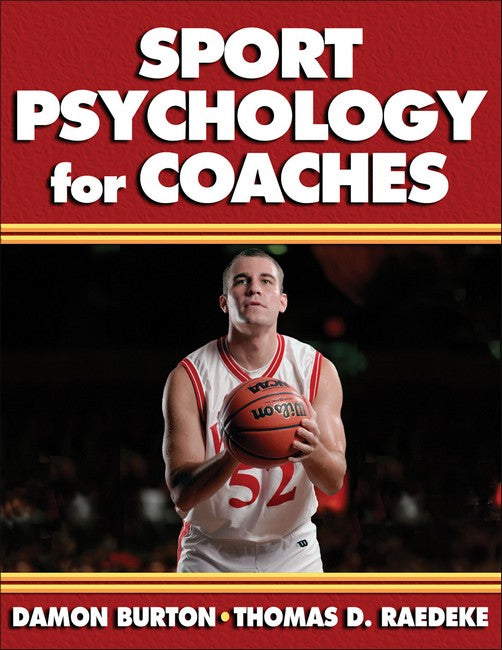Damon Burton is a professor of sport psychology at the University of Idaho and has taught undergraduate and graduate applied sport psychology courses since 1983. At Idaho, Burton created master's and doctoral programs to develop sport psychology consultants with strong backgrounds in both counseling and performance enhancement. A fellow and former president of the Association for Applied Sport Psychology (AASP), he is an AASP-certified consultant and past chair of the certification committee. A former athlete and coach who has worked extensively in coaching education for almost 30 years, educating over 4,500 coaches, Burton has consulted with coaches and athletes from youth sport to Olympic and professional levels on the development of mental skills in both individual and team settings. He coauthored Competitive Anxiety in Sport, authored or coauthored numerous research studies evaluating the effectiveness of mental skills training programs, and supervised or mentored many master's and doctoral students in their work helping coaches and athletes develop mental skills. Burton is past chair of the American Alliance for Health, Physical Education, Recreation and Dance (AAHPERD) Sport Psychology Academy and a longtime member of the North American Society for the Psychology of Sport and Physical Activity (NASPSPA). He earned a master's degree in sport psychology from the University of Wisconsin at Madison and a PhD in sport psychology from the University of Illinois, specializing in applied sport psychology and coaching education. Thomas D. Raedeke is associate professor of sport and exercise psychology at East Carolina University. Since 1992, Raedeke has taught graduate and undergraduate applied sport psychology courses focusing on coaching education and mental skills training at the University of Oregon, University of Colorado, and East Carolina University, earning the University of North Carolina's Board of Governor Distinguished Professor for Teaching Award in 2007. A research expert on motivation, stress, and burnout, Raedeke has worked with athletes and coaches from a variety of sport types and skill levels. He is a certified consultant through the Association of Applied Sport Psychology (AASP), where he is chair of the Health and Exercise Psychology Committee. He is also a member of the North American Society for the Psychology of Sport and Physical Activity (NASPSPA) and the American Alliance for Health, Physical Education, Recreation and Dance (AAHPERD). Raedeke is past chair of the National Association for Sport and Physical Education (NASPE) Sport and Exercise Psychology Academy. A former collegiate wrestler, Dr. Raedeke earned his master's degree from the University of Idaho and a PhD from the University of Oregon, with a focus on sport and exercise psychology. He has also served as a research assistant in sport psychology at the United States Olympic Training Center in Colorado Springs and as an instructor for American Sport Education Program (ASEP) coaching courses.
Request Academic Copy
Please copy the ISBN for submitting review copy form
Description
ASEP Silver Level Series Preface Preface Acknowledgments Part ICreating a Solid Foundation Chapter 1Coaching Philosophy Developing a Positive Coaching Philosophy Understanding Competition and Using It Constructively Chapter 2Communication What Is Communication? Sending Effective Messages Attentive Listening Conflicts and Confrontations Chapter 3Introduction to Mental Skills Training Psychological Factors and Performance Excellence Does MST Work? The MST Approach Roadblocks and Myths Surrounding MST Developing MST Part IIDeveloping Mental Training Tools Chapter 4Goal Setting What Are Goals and Why Use Them? Characteristics of Effective Goals Making Goals Work: The Goal Implementation Process Developing Athletes' Goal-Setting Skills Chapter 5Imagery What Is Imagery? Factors Influencing the Effectiveness of Imagery Using Imagery Effectively Developing an Imagery Training Program Chapter 6Relaxation and Energization What Is Relaxation? Relaxation Strategies What Is Energization? Energization Strategies Developing Athletes' Relaxation and Energization Skills Chapter 7Self-Talk What Is Self-Talk? How Self-Talk Works Positive Versus Negative Thinking Optimizing Self-Talk Developing Athletes' Smart-Talk Skills Part IIIEnhancing Mental Skills Chapter 8Motivation What Is Motivation? Athletes' Needs and Intrinsic Motivation Impact of Rewards Handling Success and Failure Creating a Mastery-Oriented Motivational Atmosphere Chapter 9Energy Management Understanding Energy Management How Does Arousal Affect Performance? Why Underarousal and Overarousal Impair Performance Determining Optimal Energy Zones Mental Side of Arousal Developing Athletes' Energy Management Skills Chapter 10Attention Understanding Attention Attentional Capacity Selective Attention Sustaining Focus: Concentration Implementing an Attentional Skills Program Chapter 11Stress Management Understanding Stress Stress Management Developing Athletes' Stress Management Skills Chapter 12Self-Confidence Understanding Self-Confidence Conceptualizing Self-Confidence Boosting Self-Confidence Developing Team Confidence Developing and Maintaining Self-Confidence During Competition Self-Fulfilling Prophecy: Confidence Booster or Deflator? Developing Athletes' Self-Confidence Final Thoughts: Developing Ultimate Confidence Part IVIntegrating Mental Training Tools and Skills Chapter 13Mental Plans Understanding Mental Plans Types of Mental Plans Role of Triggers, Releases, and Cue Words Developing Mental Plans Developing Athletes' Mental Toughness Skills Chapter 14Mental Skills Training Programs Getting Started Components of Effective MST Programs Implementing a Basic MST Program Appendix A: Answers to Review Questions Appendix B: Relaxation and Energization Scripts Appendix C: Test of Performance Strategies Glossary References and Resources Index About the Authors

